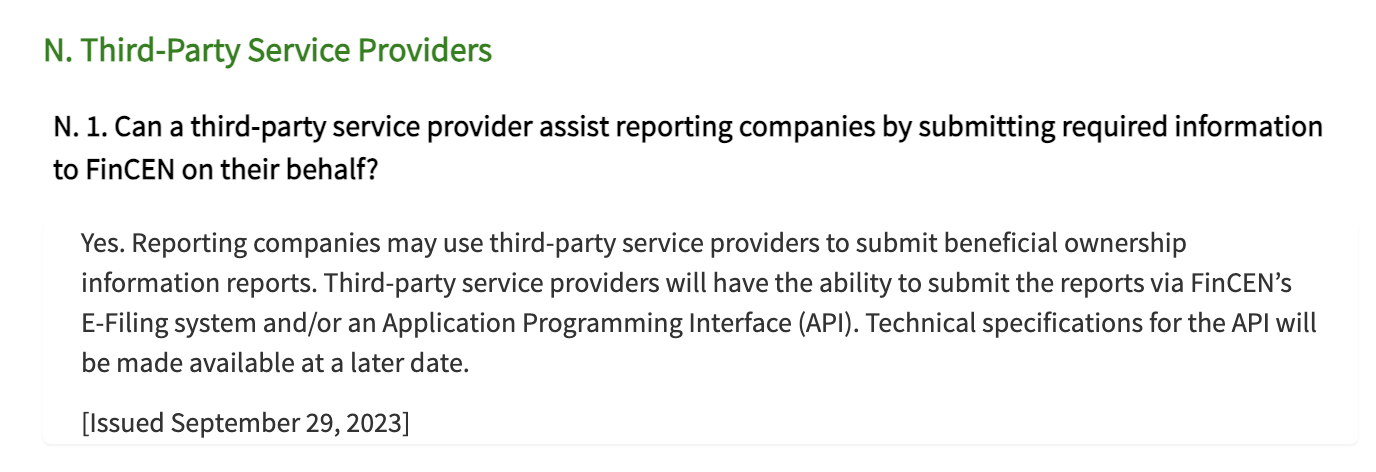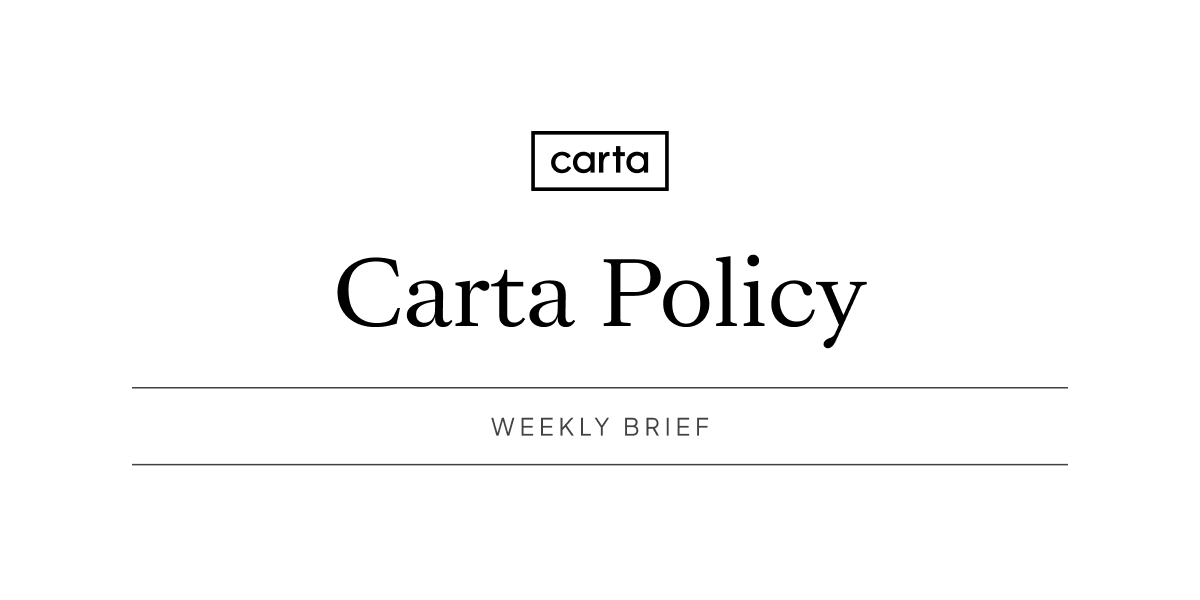Topline
-
Carta and allies secure win to assist small businesses with CTA compliance
-
House remains paralyzed until it elects a new speaker
-
Supreme Court opens new term by considering cases with private market implications
-
SEC dealt another crypto-related loss in court
Carta and allies secure win to assist small businesses with CTA compliance
In August, Carta and 19 co-signatories sent a letter to the U.S. Treasury Department’s Financial Crimes Enforcement Network (FinCEN) urging the agency to simplify the process for small businesses and other covered entities to submit beneficial ownership information (BOI) under the new Corporate Transparency Act (CTA) reporting requirements. Compliance with the CTA is set to begin on January 1, 2024. The law’s BOI reporting requirements will be a substantial shift in the reporting obligations for affected companies—mainly startups and other small businesses. To meet the new requirements, companies need to start preparing.
Last week, FinCEN responded to Carta’s coalition letter by updating their FAQs to address our top recommendations—-enable companies to use third-party intermediaries to submit BOI reports and establish an application programming interface (API) for intermediary filers. With this win secured, Carta is in the process of building out a solution for CTA compliance.

What’s next: Treasury and FinCEN have strongly reiterated that they are maintaining the January 1 implementation date for CTA. Here are the key deadlines for reporting companies:
-
Existing companies, formed before January 1, 2024, will have from January 1, 2024, through January 1, 2025, to file BOI reports.
-
Entities created or registered on or after January 1, 2024, and before January 1, 2025, would have 90 days from entity creation or registration, instead of 30 days ( proposed rule)
-
Entities created or registered on or after January 1, 2025, have 30 days from entity creation or registration.
House seeking speaker (again)
In a surprising plot twist, the House and Senate passed a bipartisan short-term funding bill to prevent a government shutdown. The cost: one House speaker. In a stunning show of rebellion, Rep. Matt Gaetz filed a motion to vacate the speakership. Along with seven Republicans and the entire Democratic caucus, Gaetz successfully ousted Kevin McCarthy from his role as speaker—the first time in American history a speaker has ever been removed.
What’s next: House Financial Services Committee Chairman Patrick McHenry is acting speaker pro tempore. The House will reconvene next week and is expected to hold speaker elections. With no clear successor, it is uncertain how long this process could take. The top two candidates—Majority Leader Steve Scalise and House Judiciary Chair Jim Jordan—each have issues that will make it hard for them to secure support from 218 Republicans. Some Republican members have vowed to withhold support for any candidate unless the motion to vacate rules are amended to prevent a retaliatory ouster from happening again, but the hardliners who sacked McCarthy are unlikely to cede this weapon. Democrats are unlikely to help the Republican caucus choose a leader, at least initially.
Why it matters: Government funding will expire just before Thanksgiving, setting up another shutdown showdown. The House will essentially remain paralyzed until a new Speaker is elected, as McHenry’s powers as speaker pro tempore are fairly narrow. Increased partisan infighting could draw the process out. The events of the past week have deepened divisions not only within the Republican caucus, but have further soured relations between Republicans and Democrats and have damaged moderate alliances. Opportunities for bipartisanship were slim before, but the prospects are even slimmer now, further diminishing the likelihood of a capital markets or end-of-year tax package.
Supreme Court opens new term by considering cases with private market implications
This week, the Supreme Court kicked off its 2023-24 term, which will include a number of cases that could have implications for the venture ecosystem:
-
CFPB: The future of the Consumer Financial Protection Bureau (CFPB) is at stake as the Court considers the Fifth Circuit’s decision that held the agency’s funding structure to be unconstitutional in violation of the appropriations clause. The CFPB has expanded its regulatory lens to scrutinize non-banks such as fintech that have a consumer nexus, so any decision could have a direct effect on the innovation ecosystem. If the justices uphold the lower court decision, past and future CFPB rulemakings and enforcement efforts could be in jeopardy. However, several conservative justices expressed skepticism around arguments that the congressionally directed funding structure is unconstitutional as Congress could change the rules, so there is a chance the agency could avoid a potentially devastating blow.
-
Agency powers: The Court will consider a case that could overturn the Chevron doctrine, which gives agencies wide latitude to interpret the statutes they enforce. The judicial branch has traditionally been deferential to regulators through the lens of the Chevron doctrine, but as of late, courts have viewed regulatory authority with more scrutiny. If Chevron is overturned or further limited, the power of federal agencies will be significantly curtailed. Such a move would have major implications for the SEC, who is already being challenged in court for exceeding its legal authority in adopting a number of rules, including the recently adopted private fund adviser rules. The Court will also consider whether the SEC’s in-house administrative courts are constitutional.
-
Tax: The Court will consider a tax case to determine whether the mandatory repatriation tax (which levies tax on foreign earnings even if they have not been distributed) is constitutional under the Sixteenth Amendment. The issue at stake in the case is whether an individual or business can be taxed on unrealized gains. While the case at hand involves a repatriation tax and a mere $15K in dispute, its ramifications could upend swaths of the tax code, including aspects around investment income and equity. The Court decision may call into question such areas as the passthrough treatment of partnerships and S corporations and mark-to-market regimes—all of which are taxes currently assessed on profits that partners or shareholders may not have personally received. The Joint Committee on Taxation recently published a letter outlining the potential implications of this ruling.
SEC dealt another crypto-related loss in court
This week, a federal judge rejected the SEC’s appeal of the Ripple decision that found Ripple did not violate federal securities laws by selling its XRP token on public exchanges. The July ruling buoyed the crypto industry and further put the SEC’s aggressive crypto enforcement regime into question.
-
Traditionally, appeals happen after the conclusion of the case. This was an interlocutory appeal, which would have allowed the question of whether platform sales in this case were securities to be decided by the appellate court before the underlying case concluded.
-
The SEC can still appeal after the trial, which is currently set to resume in April 2024.
Why it matters: The denial of the SEC’s appeal is yet another setback to the SEC’s crypto enforcement efforts. Meanwhile, the SEC is still grappling with other courtroom losses, including the Grayscale case, where the SEC’s denial of a spot Bitcoin ETF was put into question. While Congress stalls on crypto legislation, the courts continue to assert themselves and continue to chip away at the SEC’s authority.
News to know
-
SEC approves Pershing Square SPARC. This novel investment vehicle is similar to a SPAC, except that investors know what private companies are targeted before buying in.
-
CFTC lays out revamped rulemaking agenda. CFTC Chair Rostin Behnam announced that the CFTC is looking to focus their agenda on cyber risk, guidance on the use of third-party technology providers, and new rules intended to curtail conflicts of interest for derivatives exchanges.
-
U.S. Supreme Court to decide if SEC disclosure violations are valid basis for shareholder fraud claims. The Supreme Court has granted a petition to review a Second Circuit decision that allowed a private shareholder class action suit for securities fraud to proceed based on a violation of an administrative disclosure rule (Item 303 of Regulation S-K) in the absence of other misleading statements.
-
Treasury IG finds that the IRS may have overstated taxpayer interest in agency-run e-filing system. According to a report from the Treasury Inspector General for Tax Administration, the IRS used a survey that may have overstated taxpayer interest in a potential agency-run direct e-filing system in a report it issued earlier this year, which also included cost estimates that the agency couldn’t back up.
-
Pay stagnation leading to accounting shortage. Some of the nation’s largest college accounting programs are seeing declined enrollment, with a survey showing higher starting salaries with other majors as the top reason why non-accounting majors who had considered the field decided against it. The shortage of recruits marks a sharp turn from 15 years ago when accounting’s appeal grew after the 2008 financial crisis because of its stability.
Upcoming events
-
Carta event: Unlocking Liquidity for Employees in APAC: The Endowus Story - October 10 at 8:00 p.m. PT / 11:00 p.m. ET
-
Carta Policy Live - October 13 at 9:00 a.m. PT / 12:00 p.m. ET
-
DC Startup Week: Tax Planning & Policy Updates for Small Businesses - October 19 at 3:00 p.m. ET at the International Square Conference Center, D.C.
-
SEC Chair Gensler will speak at the Securities Enforcement Forum 2023 - October 25 at 5:00 a.m. PT / 8:00 a.m. ET

